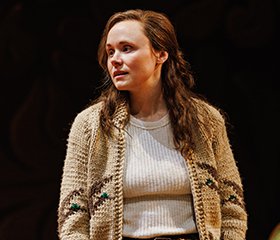I’ve seen productions of Uncle Vanya in which the actor playing Sonia seemed to see the character as a victim – the family member who got left behind on the farm while others raced off to the pleasures of the big city. No chance of that reading from Alison Pill, whose intelligently considered, multi-faceted interpretation is immediate whether you are watching her on the stage of the Beaumont these days or talking with her about the play itself.
“Sonia’s a very difficult character,” Pill told me. “I wasn’t interested in focusing on her as only a grown-up girl,” the actor continued, with an insight into both girlhood and womanhood gained at least in part from having a career in which she, after starting out in her native Canada at a young age, quickly became known for an intelligence born of precocity but honed by rich stage-and-screen experience.
Speaking of the production’s director, Lila Neugebauer, and its adaptor, Heidi Schreck, Pill commented, “We didn’t want to make Sonia a girl of 19 or 20, to whom things merely happen. We wanted to find the adult-ness of her, someone who may be moving toward her last chance at having children but who still has choices. In other words: what does thirtysomething mean not just in Chekhov’s time but right now?”
One of Sonia's characteristics, Pill commented, is “an inability to see what seems obvious to everyone else. This may be a defect but it’s also hugely positive. Whether Sonia's blindness to what’s apparent is conscious or unconscious it allows her to keep going.”
Every time I see Uncle Vanya I’m struck by the moment when we learn that the estate on which Sonia lives is owned not by her worldly father but in fact was left to her by her late mother. Why doesn’t Sonia seem to be more empowered by this fact? Pill replied: “Lila and Heidi and I discussed this question and tentatively decided that Sonia probably doesn’t have full power of ownership at the time the story takes place. She may not assume full rights until her father dies.”
One striking aspect of this Vanya production is its relative modernity – no samovars or horse-drawn carriages. “I hope people who might normally be scared off by Chekhov,” Pill said, “will be less put-off by our production. I’m not saying that a version that is more recognizably late-19th-century is necessarily harder to grasp today. Just that something of our day and age may make it easier to acknowledge problems that are still with us deeply – deforestation, the cultural divide between rural and urban.”
Also sexism. Pill said: “Uncle Vanya reminds us of how men come home and complain of the strain of being out in the world while the women, whether they work or not, are handling most of the stresses at home. They provide largely invisible labor without being directly compensated for it.” Pill continued: “At the same time, the work of helping to run the estate gives Sonia a purpose to set against other disappointments – her unrequited love for Astrov, for example.”
Seeing a performance Chekhov, Pill remarked, may afford us greater satisfaction than only reading the text. “You can read a Stoppard play,” she said, “and have an enjoyment that is complete in itself. You read a Chekhov play and think: all this talk of the irritations of daily existence. What’s the pleasure in that? You need to hear the words embodied by humans to realize just what a genius Chekhov was.” Pill added: “A performance affords you the comedy – we laugh at the mundane because we see ourselves there. And however hopeless Uncle Vanya may appear when read it’s not as hopeless-feeling in performance. Faced with the frustrations of existence Sonia at the end doesn’t collapse. When Vanya says, ‘Everything feels so heavy tonight,’ Sonia replies, ‘I know but what can we do? We have to live.’”
Brendan Lemon is a freelance journalist in New York.
